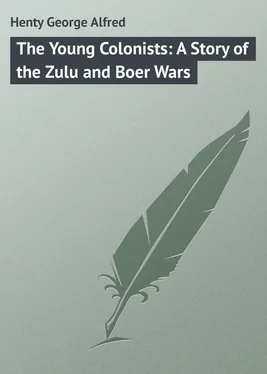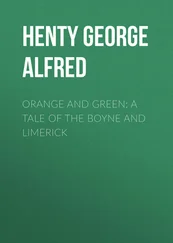George Henty - The Young Colonists - A Story of the Zulu and Boer Wars
Здесь есть возможность читать онлайн «George Henty - The Young Colonists - A Story of the Zulu and Boer Wars» — ознакомительный отрывок электронной книги совершенно бесплатно, а после прочтения отрывка купить полную версию. В некоторых случаях можно слушать аудио, скачать через торрент в формате fb2 и присутствует краткое содержание. Жанр: foreign_prose, foreign_children, на английском языке. Описание произведения, (предисловие) а так же отзывы посетителей доступны на портале библиотеки ЛибКат.
- Название:The Young Colonists: A Story of the Zulu and Boer Wars
- Автор:
- Жанр:
- Год:неизвестен
- ISBN:нет данных
- Рейтинг книги:4 / 5. Голосов: 1
-
Избранное:Добавить в избранное
- Отзывы:
-
Ваша оценка:
- 80
- 1
- 2
- 3
- 4
- 5
The Young Colonists: A Story of the Zulu and Boer Wars: краткое содержание, описание и аннотация
Предлагаем к чтению аннотацию, описание, краткое содержание или предисловие (зависит от того, что написал сам автор книги «The Young Colonists: A Story of the Zulu and Boer Wars»). Если вы не нашли необходимую информацию о книге — напишите в комментариях, мы постараемся отыскать её.
The Young Colonists: A Story of the Zulu and Boer Wars — читать онлайн ознакомительный отрывок
Ниже представлен текст книги, разбитый по страницам. Система сохранения места последней прочитанной страницы, позволяет с удобством читать онлайн бесплатно книгу «The Young Colonists: A Story of the Zulu and Boer Wars», без необходимости каждый раз заново искать на чём Вы остановились. Поставьте закладку, и сможете в любой момент перейти на страницу, на которой закончили чтение.
Интервал:
Закладка:
On arriving at the farm Mrs Humphreys was glad to find that the house, though rough, was substantial. It was built of stone. The walls were of great thickness, as the stones were laid without mortar, with which, however, it was faced inside and out. One large room occupied the greater portion of the ground floor; beside this was a small sitting-room. Upstairs were four bedrooms. For the time the small room downstairs was turned into a bedroom, which Mr and Mrs Humphreys occupied. The four bedrooms upstairs just held the rest of the party. The out-houses consisted only of a large barn and a rough stable.
Mr Humphreys at once rode over to Newcastle, and obtained the services of a mason and six Kaffirs, and proceeded to add a wing to the farmhouse. This was for the use of Johnson and his wife, and Harrison. The whole party were, however, to take their meals together in the great kitchen. A hut was also built for the Kaffirs, and another large stable was erected.
A few days after his arrival Mr Humphreys went across the border into the Transvaal, taking Harrison and two of the Kaffirs with him, and returned a fortnight later with a herd of 400 cattle, which he had purchased. He also bought three yoke of oxen, broken to the plough. Hitherto the farm had been purely a pastoral one, but Mr Humphreys at once began to break up some land for wheat and Indian corn. The Kaffirs were set to work to fence and dig up a plot round the house for vegetables, and to dig holes near it, over a space of some acres, for the reception of 3000 young fruit-trees – apples, pears, peaches, and plums, – which he had bought at Pieter-Maritzburg, and which were to come up in two months’ time. He also bought six riding-horses.
In a few weeks the farm assumed quite a different appearance. A gang of Kaffirs, ten strong, had been hired to hurry on the work of preparing the orchard and erecting a fence round it. Wood was, Mr Humphreys found, extremely scarce and dear, the country being absolutely bare of trees, and wood for fuel was only obtained in kloofs or deep hollows, and had to be fetched long distances.
“I suppose,” Mrs Humphreys said to her husband one evening, “you mean to make cattle-raising your principal point?”
“No,” he said; “every one raises cattle, and the Dutch can do it cheaper than we can; they have immense tracts of land, and their Kaffir labour costs them next to nothing. I do not say that we could not live and to a certain extent thrive on cattle, but I think that there is something much better to be done. Wood is an awful price here, and all that is used has to be brought up from the coast. I think therefore of planting trees. The climate is magnificent, and their growth will be rapid. They will of course require fencing to keep out the cattle, but I shall do that, as I am doing the orchard, with wire fencing and light iron-uprights. Labour is plentiful, and there are large nurseries near Pieter-Maritzburg, where I can procure any number of young trees; so I mean to plant 200 acres a year – in ten years the whole farm will be planted, and the loppings for poles and firewood will in a very short time after planting begin to pay well. In fifteen years the first 200 acres will be fit to fell, and the property will be worth a very large sum of money. Of course we can sell out before that if we like. But at the present price of wood up here, or even should it fall to a quarter of its present price, the value of the 2000 acres of wood will in twenty years be extremely large.”
The boys were delighted with their new life. Mr Humphreys had, before leaving England, bought for Dick a Winchester repeating-rifle. These arms are very light, and Dick was able to carry his without difficulty; and very shortly after their arrival his father had a mark erected at a distance from the house, at which he could practise with safety. Game was abundant all over the country. Herds of deer and antelope of various kinds often swept past in sight of the farmhouse, and winged game also abounded.
Mr Humphreys had at home been considered a first-rate shot at partridges, and had for four or five years belonged to the Castleton volunteers, and had carried off many prizes for rifle-shooting. He was now able, by going out for a few hours once or twice a week, to keep the larder well supplied, and the little flock of fifty sheep, which he had bought for home-consumption, was but seldom drawn upon. The Kaffirs were fed upon mealies, as they call Indian corn, of which Mr Humphreys had no difficulty in purchasing sufficient for his wants from the neighbouring farmers.
His next neighbours were two brothers, Scotchmen, named Fraser, who lived at a distance of four miles. They rode over the day after the travellers’ arrival, and offered their services in any way. Mr Humphreys, however, was well supplied with stores of all kinds, and his two white labourers, being both handy men, were able to do all that was required about the house.
The Frasers proved pleasant neighbours, and often rode over and spent Sunday with the Humphreys, and the boys sometimes went over and spent the day with them.
A Kaffir lad, son of one of the men engaged upon the farm, was hired by Mr Humphreys as a special attendant for Dick. On these vast undulating plains, where there are no trees to serve as a landmark, it is exceedingly difficult for a stranger to find his way. Dick was told by his father that, whether riding or walking, he was always to take the Kaffir boy with him; and except when he was indulging in a gallop the lad was easily able to keep up with him. He had been born a hunter, and soon taught Dick how to stalk the timid deer, and, as the lad improved in his shooting, he was ere long enabled to keep the larder supplied – a duty which Mr Humphreys gladly handed over to him, as every minute of his own time was occupied by his work on the farm.
Of an evening after supper, which was partaken of at the conclusion of work, the men retired to their own wing and Mrs Humphreys and the two girls sat down to their sewing by the fire; for upon the uplands the evenings are quite cold enough to find a fire a comfort in winter. Then the boys would take out their lesson-books and work steadily for three hours. Under the changed conditions of their life, Mr Humphreys felt that Dick might, if he chose, well discontinue his study of the classics, and his work therefore consisted in the reading of history, travels, and books of scientific knowledge.
“Next to being a learned man,” his father said to him, “the best and most useful thing is to be a thoroughly well-informed man on all general subjects.”
John, however, continued his studies as before; his life of outdoor exercise strengthened and improved him, and he no longer wished to be always sitting with a book in his hand – still, he had a natural love of study, which his father encouraged, deeming it possible that as he grew up he might be unwilling to embrace the life of a colonist, in which case he determined to send him home to finish his education in England, and afterwards to start him in any profession he might select.
Finding that the cost of carriage up the country was very high, and as he would yearly require many waggon-loads of young trees and fencing Mr Humphreys determined to do his own teaming; he therefore bought two of the large country-waggons and set a Kaffir to work to break in some young steers to the yoke.
Six months after their arrival in the colony they had for the first time visitors to stay at the farm – Mr Jackson, his wife, his son Tom, and two daughters coming out to settle near them. This was a great delight to the boys, and fortunately Mr Jackson was able to buy a farm of 500 acres adjoining that of his friend; the house, however, was but a cabin, and while a fresh one was being erected the family remained guests of the Humphreys. Mr Jackson had, at his friend’s advice, brought with him from England a labourer with his wife and family, who at once took up their residence in the hut on the farm.
Читать дальшеИнтервал:
Закладка:
Похожие книги на «The Young Colonists: A Story of the Zulu and Boer Wars»
Представляем Вашему вниманию похожие книги на «The Young Colonists: A Story of the Zulu and Boer Wars» списком для выбора. Мы отобрали схожую по названию и смыслу литературу в надежде предоставить читателям больше вариантов отыскать новые, интересные, ещё непрочитанные произведения.
Обсуждение, отзывы о книге «The Young Colonists: A Story of the Zulu and Boer Wars» и просто собственные мнения читателей. Оставьте ваши комментарии, напишите, что Вы думаете о произведении, его смысле или главных героях. Укажите что конкретно понравилось, а что нет, и почему Вы так считаете.












